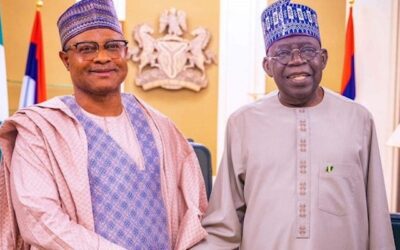Proposed N5,000 Transportation Grant: How Sustainable In Addressing Post-Subsidy Economic Hardships?

The federal government has announced that, it is planning to implement a N5,000 per month grant to 40 million vulnerable Nigerians for one year to cushion the adverse effect that the proposed removal of petrol subsidy may bring next year.
The General Managing Director of Nigerian National Petroleum Corporation (NNPC) Mele Kyari has hinted that the Federal Government might totally remove petrol subsidy by next year and plans are being made to replace it with a monthly N5000 transport grant to poor Nigerians according to the Minister of Finance, Zainab Ahmed. Speaking at the launch of the World Bank Nigeria Development Update (NDU), Ahmed said the transport grant will target about 30 to 40 million Nigerians who make up the poorest population of the country.
Though details are still sketchy, when preliminary enquiries were made on how the funds for the N5,000 palliative package would be sourced, the media office of the Finance Minister disclosed that the funding would come from the Federation Account sequel to further consultations that will be made to secure the buy-in of all members of FAAC.
It’s pertinent to note that, petrol subsidies have been in place in Nigeria since the 1970s. It began with the government routinely selling petrol to Nigerians at below cost price. But most Nigerians were unaware that this was being done.
Petroleum subsidies became institutionalised in 1977, following the promulgation of the Price Control Act which made it illegal for some products (including petrol) to be sold above the regulated price. This law was introduced by the General Olusegun Obasanjo regime in order to cushion the effects of the global “Great Inflation” era of the 1970s, caused by a world-wide increase in energy prices.
Between 2006-2018 Nigeria spent about 10 trillion Naira (or US$24.5 billion at the then official exchange rate of 411 Naira = US$1) on petroleum subsidies.
In 2019 and 2020 about 3 trillion Naira ($7 billion) was spent on subsidies. It means that Nigeria has spent over $30 billion on petroleum subsidies over the past 16 years. Although the absolute amount spent on petrol subsidies has increased over time, the relative sum spent has decreased.
In 1970, about 72% of the cost of a litre of petrol was paid by the government, but that figure fell to 43% in 2011. This means that Nigerians are increasingly bearing the burden of petrol price increases. This may explain why they vehemently oppose, through public protests, any attempt at reducing or eliminating subsidies.
Various administrations have unsuccessfully tried to remove petrol subsidies since 1979. President Shehu Shagari’s government; from 1979 to 1983 increased the price of petrol in 1982, from 15.3 kobo a litre to 20 kobo and this happened without the government making reference to easing subsidies. Then in 1986 President Ibrahim Babangida announced a partial removal of oil subsidies, which saw petrol price rise from 20 kobo to 39 kobo per litre. This followed his implementation of the Structural Adjustment Program as set out by the International Monetary Fund.
There was a huge public uproar against the decision, which reached a crescendo when workers, students and civil society groups embarked on massive demonstrations across the country. Massive and sustained protests against Babangida’s economic policies played a big role in his hurried exit from power. The administrations that followed left subsidies in place.
It wasn’t until 2012 that major action was taken again. President Goodluck Jonathan decided to discard the subsidy regime and made public his intentions to use the savings to invest in education and infrastructure. But he encountered fierce pushbacks from labour unions, political opponents, students, and civil society groups. He was subsequently forced to suspend his subsidy elimination plans.
Last year in June, President Muhammadu Buhari’s administration announced it was eliminating petroleum subsidies. It said it had granted approval to the Petroleum Products Pricing Regulatory Agency (PPPRA) to remove the price cap that was in place for petrol.
But by March of this year, the government announced it was keeping the pump price of petrol unchanged despite increasing crude costs. This effectively marked a return to subsidies.
The implementation of the proposed N5,000 monthly grant to 40 million Nigerians will cost the Federal Government N2.4 trillion annually. Moreover, investigations have revealed that the list of poor Nigerians on the Federal Government’s National Social Register had surpassed 40 million and may hit 43 million by December 2021; a number which is expected to keep growing. This implies that the figure to be spent on the subsidy palliative may hit N2.58 trillion in one year and keep increasing annually. Eliminating petroleum subsidies and using the funds saved for cash hand-outs seems like an economic model that is both cost-inefficient and unproductive. If subsidies are to be removed, the savings from it should be pooled into capital expenditure only; to create social goods that will improve the lives of Nigerians and set the pace for massive infrastructural development. Refineries are in comatose, the state of roads are deplorable, many Nigerians cannot access potable water or electricity, many primary health centres and rural schools are in sorry state. If subsidies are removed and the monies are not used to address these critical deficits, it will make a complete mockery of the whole plan.
In 2019, the federal government set aside N305 billion for petrol subsidy payments in the 2019 budget. It announced an end to subsidy in March 2020 through the introduction of a price modulation policy. The cost resurfaced after the COVID-19 pandemic hit the economy. Speaking in June this year at the public consultative forum on the draft 2022-2024 medium-term expenditure framework/ fiscal strategy paper (MTEF/FSP), Zainab Ahmed disclosed that petrol subsidy gulps N150 billion every month. According to her, the subsidy does not benefit the average Nigerian but marketers who buy subsidised petrol from Nigeria and sell it in neighbouring countries at a higher price.
The announcement has continued to generate reactions among Nigerians both at home and in diaspora. While some Nigerians believed that, petrol subsidy removal will help to grow the nation’s economy, others are of the view that, the timing is wrong and, if implemented, it will add to the woes of many Nigerians who are already facing untold economic hardships.
For instance, the Senate, Trade Union Congress, Nigeria Labour Congress and experts have disagreed with the Federal Government’s plan to remove petrol subsidy next year and replace it with a N5,000 monthly transport grant to 40 million Nigerians.
While the Senate said there was no provision for such grant in the 2022 budget, Trade Union expressed shock that government could come up with this when negotiations on subsidy removal between government and the Labour movement is still ongoing, saying it is unacceptable. The Nigerian Labour Congress on its part, described the development as an open invitation for unrest and revolt.
In fact, the contemplation by government to increase the price of petrol by more than 100% is a perfect recipe for an aggravated pile of hyper- inflation and astronomical increase in the price of goods and services. This will open a wide door to unintended social consequences such as degeneration of the current insecurity crises and possible citizens’ revolt. And currently, the country is battling with series of security challenges, creating an avenue for another one is totally uncalled-for for.
It’s important to understand that, the argument that the complete surrender of the price of petrol to market forces would normalize the curve of demand and supply as is being wrongly attributed to the current market realities with cooking gas, diesel and kerosene is very obtuse.
The truth is that these commodities which Nigeria can easily produce have been priced out of the reach of most Nigerian families with majority of Nigerians resorting to tree felling and charcoal for their energy needs.
Another issue that has made many Nigerians to have reservation for this proposed palliative package is the controversy that surrounds the current conditional cash transfer (CCT) program meant for poor Nigerians. There is no satisfactory explanation or logical basis for the selection of these 40 million Nigerians, and there is deep belief that the number of people that get money from the scheme could be less than the figure being published by officials. To many Nigerians, the program has not seemingly benefitted majority of Nigerians or done anything to reduce the widespread poverty in the country. The scheme is being plagued by lack of transparency, poor data, pervasive corruption and lack of sufficient political will to ensure that funds are being used for purposes they were created. Such interventions programme of government are often used as conduit pipes to siphon funds without no real benefit or impact on the lives of the vulnerable Nigerians. This proposed 5,000 per month palliative is therefore seen as an inadequate scheme to effectively address the heightened economic difficulties that the subsidy removal will bring across board.
It is critical for government to properly consider the various implications of this policy before implementation and come up with a masterplan that will clearly define a post-subsidy plan. The subsidy regime; regardless of its effect in reducing the burden on consumers has long been considered a cesspool of corruption that needs to be mopped up decisively; but deciding to put an end to subsidy payments and using even more funds to dole out cash to vulnerable Nigerians may not be a sustainable solution to this subsidy imbroglio.


